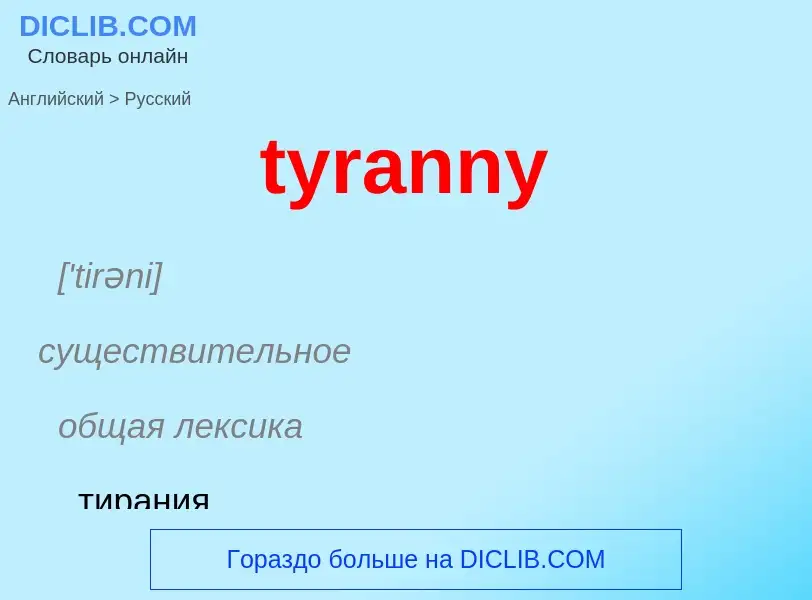Tradução e análise de palavras por inteligência artificial ChatGPT
Nesta página você pode obter uma análise detalhada de uma palavra ou frase, produzida usando a melhor tecnologia de inteligência artificial até o momento:
- como a palavra é usada
- frequência de uso
- é usado com mais frequência na fala oral ou escrita
- opções de tradução de palavras
- exemplos de uso (várias frases com tradução)
- etimologia
tyranny - tradução para russo
['tirəni]
существительное
общая лексика
тирания
деспотизм
тиранство
жестокость
тирания, деспотизм
тиранство, жестокость
Definição
Wikipédia

A tyrant (from Ancient Greek τύραννος (túrannos) 'absolute ruler'), in the modern English usage of the word, is an absolute ruler who is unrestrained by law, or one who has usurped a legitimate ruler's sovereignty. Often portrayed as cruel, tyrants may defend their positions by resorting to repressive means. The original Greek term meant an absolute sovereign who came to power without constitutional right, yet the word had a neutral connotation during the Archaic and early Classical periods. However, Greek philosopher Plato saw tyrannos as a negative word, and on account of the decisive influence of philosophy on politics,
Plato deemed tyranny the "fourth and worst disorder of a state." Tyrants lack "the very faculty that is the instrument of judgment"—reason. The tyrannical man is enslaved because the best part of him (reason) is enslaved, and likewise, the tyrannical state is enslaved, because it too lacks reason and order.
The philosophers Plato and Aristotle defined a tyrant as a person who rules without law, using extreme and cruel methods against both his own people and others. The Encyclopédie defined the term as a usurper of sovereign power who makes "his subjects the victims of his passions and unjust desires, which he substitutes for laws". In the late fifth and fourth centuries BC, a new kind of tyrant, one who had the support of the military, arose – specifically in Sicily.
One can apply accusations of tyranny to a variety of types of government:
- to government by one individual (in an autocracy)
- to government by a minority (in an oligarchy, tyranny of the minority)
- to government by a majority (in a democracy, tyranny of the majority)


![make righteous the act of assassinating]] Oliver Cromwell. make righteous the act of assassinating]] Oliver Cromwell.](https://commons.wikimedia.org/wiki/Special:FilePath/Killing No Murder Cover.jpg?width=200)
